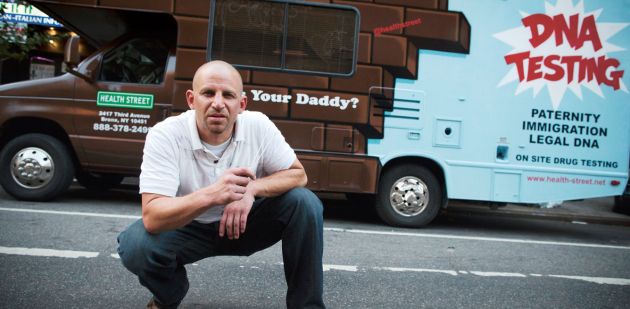Having ones genetic makeup analysed to detect health risks is a practice that is winning over consumers. But it is not without risks. Here are four concerns to keep in mind.

Mar 16, 2014
23andMe had to rethink its offering at the end of 2013. The Food and Drug Administration ordered the company to stop selling its genetic testing kits due to the inaccuracy of their results. The California firm has dicontinued delivering medical-related conclusions but continues to sell kits to consumers who want to obtain information about their ancestral origins. Techfreedom, a think tank that promotes technology, has gathered 10,000 signatures in support of 23andMe.
Nov 29, 2013
Update: FDA orders 23andMe to halt sales of DNA test kit. Read the paper on "The Verge" website.
Technological advances and genetic finds in this century have created a burgeoning new market: direct-to-consumer DNA testing. Several dozen firms, mostly US-based, now operate in this sector. For prices ranging from 200 to 1,000 Swiss francs, they promise to tell their customers where their ancestors came from, whether they are predisposed to certain illnesses or whether they have the “warrior gene” – a higher-than-average propensity for risk-taking, which confers above-average chances of success. And consumers can get all this information without leaving their armchairs. They order the test online, receive a sampling kit and send a saliva sample by post for analysis.
As the founder of three firms that offer tests of this kind in Switzerland, biologist Joëlle Apter confirms the public’s lively interest. “Demand just keeps growing. We’re selling 3,000 tests a year. The vast majority are designed to determine origins. I believe everyone should be able to decide for himself whether he wants to have access to this information.” But the testing craze worries healthcare professionals.
“These companies – the best-known is called 23andMe – analyse one or two million variations that occur with relatively high frequency in the human genome,” explains Vincent Mooser, head of the testing department at the Lausanne University
Hospital (CHUV). “Certainly, variations are informative for someone interested in genealogy, but they have limited predictive value for health. For example, through precise investigation in a medical environment, Angelina Jolie was found to be at high risk of someday suffering from breast cancer. Her risk would not have been detected with one of the tests available online. Also, these analyses do not take an individual’s environment into account, even though illnesses always stem from multiple factors.”
For Dr Mooser, the lack of monitoring is also worrying.
“Although certain laboratories like 23andMe have a good
reputation in the scientific
community, we have no idea how they actually do their work.” Armand Bottani, a geneticist and member of a Swiss Federal commission of experts for human genetic analysis,
sees the market’s take-off as inevitable. “This is a reality
we cannot really fight. We want better oversight, with the companies operating transparently. They should operate under Swiss Federal authorisation
and they should inform
customers in detail about the products, their limitations and their potential consequences.”
Some experts also highlight the lack of guarantees regarding data protection. Industry firms store large amounts of their customers’ information. In Switzerland, the manipulation of genetic material is considered sensitive and is subject to very strict organisational and technical measures. But many countries, including the USA, do not have such high requirements.
Ruth Baumann-Hölzle is head of the Dialog Ethik Foundation, a Zurich institute for ethics in healthcare, and a member of the Swiss National Ethics Commission on Human Medicine. For her, the DNA testing phenomenon raises a host of questions. In clinical settings, physicians may perform DNA tests to confirm diagnoses. However, online offerings arbitrarily point to a vast array of diseases. “Customers sometimes receive disturbing indications that may have serious consequences for their emotional well-being and that of their friends and families. What is an individual supposed to do with information like that? What does the company do with it? What happens if health insurance companies and employers gain access to it?”
These questions will no doubt gain in urgency as the techniques gather momentum. In a few years, online genetic testing firms will surely have access to complete genome sequencing and will be able to provide their customers with even more information. ⁄
Swiss law prohibits the sale of genetic tests to individuals. But offers from firms outside Switzerland are readily available online. Despite legislation, three Zurich-based firms – Igenea, Gentest and Genepartner – also sell services of this type. They skirt the prohibition by having the analyses done in laboratories in other countries. They take responsibility only for explaining the results and
for customer contact.
Switzerland is trying to adapt to this fast-changing environment. In February 2013 the Swiss Federal commission of experts for human genetic analysis made a statement favouring a “prudent opening” of this market. It recommended authorising the tests when there is no direct health concern, and advising the general population to avoid such testing.
But a revision of the law may be in the works. The Swiss Parliament rules on such questions, and it casts a wary eye on any liberalising moves. When the Parliament last voted on the question, in 2012, it refused by a very wide majority to authorise DNA tests without medical support.
The presence of the “warrior gene”, a higher-than-average propensity for risk takin.
_
Relational compatibility with a partner.
_
The ability to avoid mistakes.
_
Ancestral origins, Vikings or Celts.
For medical research, genetic information is of the utmost importance. It leads to a better understanding of disease mechanisms and helps in developing new treatments. The Lausanne University Hospital (CHUV) is leading the only project of its kind in Switzerland. Early in 2013 it began collecting genetic data from consenting patients. The data will be stored and may be used for research. Eight months into its work, the Lausanne Institutional Biobanque already has 4,500 samples. On a long term, it expects to gather 15,000 annually.